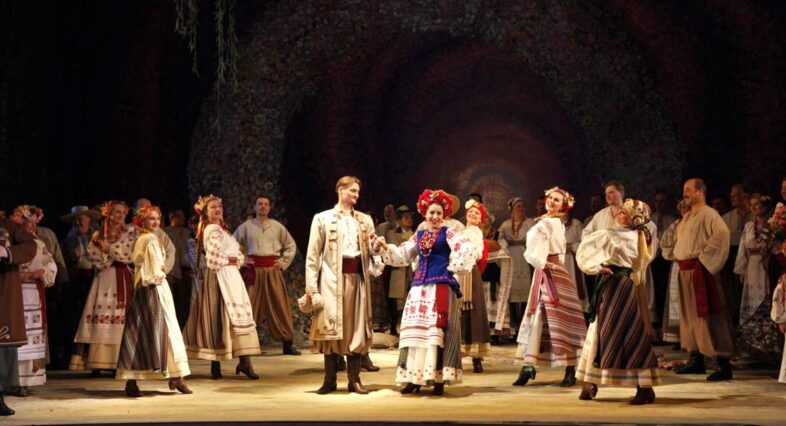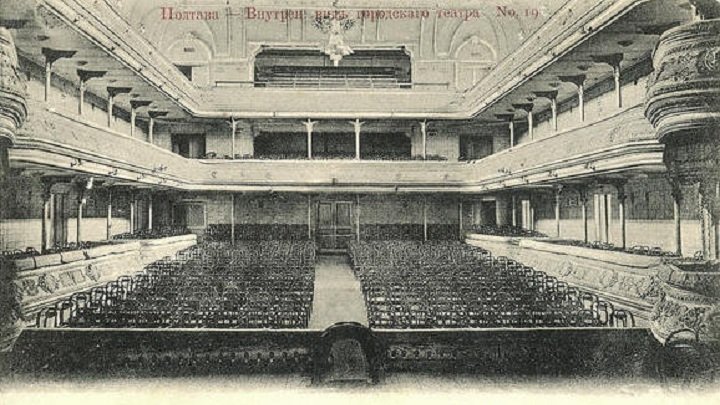Ivan Kotliarevsky is often hailed as the father of modern Ukrainian literature. In the 18th century, he not only penned the first literary work in the modern Ukrainian language but also founded a new era of Ukrainian theatre. His legacy continues to inspire Ukrainians, who often turn to him for strength in their ongoing struggle for resilience and identity.
Ivan Kotliarevsky was the master who crafted the archetypal images of Ukrainians, both male and female, in his works. According to Ukrainian literature expert Rostyslav Semkiv, Kotliarevsky’s impact is profound: “In The Aeneid, he presents the quintessential Ukrainian hero—resourceful, resilient, and destined for success despite facing adversity. Meanwhile, in his play, Natalka Poltavka, Kotliarevsky depicts an equally compelling Ukrainian heroine, steadfast and determined, who stands her ground and saves her beloved.”
The story of Ivan Kotliarevsky reflects the era he lived in. During his time, Poltava, a city in eastern Ukraine, was the heartbeat of regional social life. Following the Battle of Poltava in 1709, where Peter the Great’s forces triumphed over Ukrainian aspirations for independence—led by Hetman Ivan Mazepa and his ally, Swedish King Charles XII—the Russian Empire took a keen interest in the city. They bolstered its administrative and bureaucratic structures and erected military barracks. Amidst this transformation, local cultural figures saw a chance to flourish and expand the arts in all its forms.
This is how Poltava became home to Ukraine’s first professional theatre. Ivan Kotliarevsky took the helm as its director and penned two of his notable plays, Natalka Poltavka and Moskal the Magician (1819), specifically for the Poltava Free Theater. The theatre troupe toured various cities in Ukraine and the Russian Empire, earning widespread acclaim. Among its standout performers was the gifted comedian Mykhailo Shchepkin. Once a serf, Shchepkin’s remarkable talent—similar to that of the renowned poet Taras Shevchenko—earned him his freedom. Kotliarevsky played a crucial role in securing Shchepkin’s release from serfdom.

A scene from the play Natalka Poltavka
Some literary critics consider Natalka Poltavka to be Ivan Kotliarevsky’s crowning achievement. In this play, Kotliarevsky takes the European tradition of situational comedy and moulds it to reflect the Ukrainian context of the early 19th century. He brings to life quintessential Ukrainian characters, especially women. Among them is Terpylikha (a name derived from the Ukrainian word for “endure”), a mother who, having lost both her husband and her fortune, must navigate the harsh realities of life. Her daughter, Natalka, stands firm in her principles, refusing to enter a marriage of convenience despite their financial downfall. Once affluent townsfolk, the two women are now struggling peasants, but they maintain their dignity throughout their trials.
Meanwhile, men from the colonised nation, such as Vozny and Vyborny, become assimilated into the bureaucratic system, losing their linguistic and cultural identity. This shift is often seen as a metaphor for Ukraine’s political situation in the early 19th century: following the dissolution of the Hetmanate and the destruction of the Zaporozhian Sich, the once-free Cossacks were reduced to serfdom, and many officers faced a choice between loyalty to the Russian Empire and preserving their own identities.
Today, The Aeneid, Ivan Kotliarevsky’s burlesque poem, is still widely considered his magnum opus. Published in 1798, it marked the beginning of modern Ukrainian literature. However, literary scholars agree that Ukrainian literature evolved rather than experienced a revolution. A century before Kotliarevsky, in the 17th century, Ioannikiy Haliatovsky, the archimandrite of the Yelets Monastery in Chernihiv, was writing his sermons in a lively and accessible language. The latter half of the 17th century also saw Baroque authors producing humorous works, including poetic greetings for Christmas and Easter and comedic interludes in theatrical plays.

The interior of the Poltava Municipal Theatre
Kotliarevsky masterfully captured the essence of the Ukrainian Baroque era in his work, bringing its achievements to a new level. His innovation was creating a heroic-comic poem centred on Cossack themes. He began with the dramatic fall of Troy, which mirrored the recent decline of the Hetmanate, the Ukrainian Cossack state that emerged from the largest Cossack uprising within the Polish-Lithuanian Commonwealth between 1648 and 1764. Yet, in The Aeneid, the fall of Troy is not the end but merely the start of a new narrative, as “Aeneas will build another kingdom.”
Kotliarevsky’s poem continues the tradition of itinerant performers who used humour to unite society. It embodies a cultural code that resonates deeply with Ukrainians. While other comic adaptations of The Aeneid from that period ignored the poem’s patriotic core, Kotliarevsky and his readers saw these ideas as the heart of the work. This is why most poetic parodies of The Aeneid have faded into obscurity, whereas Kotliarevsky’s Ukrainian Aeneid remains a cornerstone of national literature.
The Ukrainian-American literary critic Hryhoriy Hrabovych interprets the burlesque elements in Kotliarevsky’s work as a purposeful critique of the pompous, artificial, and detached world of imperial society and its so-called “canonical” literature. Essentially, using irony was Kotliarevsky’s way of challenging the prevailing imperial mindset and addressing serious issues with a satirical twist. Given this, it’s only fitting that Kotliarevsky is celebrated as the father of Ukrainian literature. The poet Taras Shevchenko paid tribute to him with these lines: “You will reign, father, / As long as people live, / As long as the sun shines in the sky, / You will not be forgotten.”
Natalka Poltavka became the most frequently performed play in 19th-century Ukrainian ethnographic and national theatre. In 1918, during the Hetmanate of Pavlo Skoropadsky, artist Heorhii Narbut celebrated the grandeur of Cossack chivalry in his works. Amid the repression of the USSR in the 1960s and 70s, dissident Yevhen Sverstiuk authored The Laughter of Ivan Kotliarevsky. When Ukraine restored its independence in 1991, The Aeneid was adapted into the country’s first animated feature film. Despite the ongoing full-scale invasion in 2023, Ukraine still found the strength to commemorate the 225th anniversary of Kotliarevsky’s Aeneid, marking it as a pivotal moment in the nation’s cultural revival.

